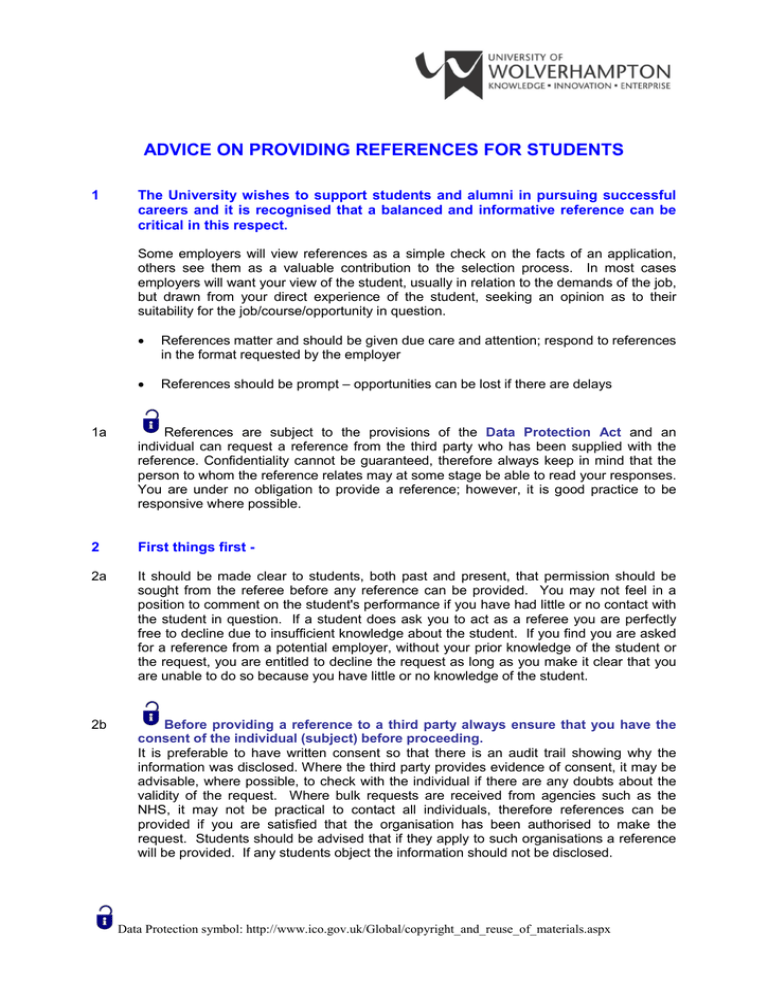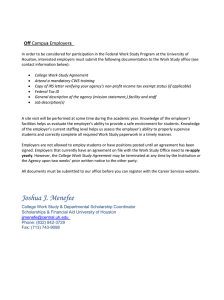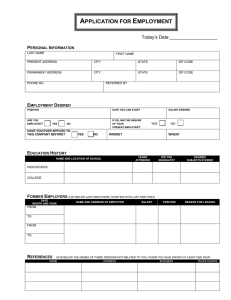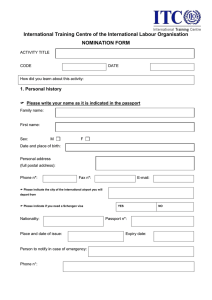advice on providing references for students
advertisement

ADVICE ON PROVIDING REFERENCES FOR STUDENTS 1 The University wishes to support students and alumni in pursuing successful careers and it is recognised that a balanced and informative reference can be critical in this respect. Some employers will view references as a simple check on the facts of an application, others see them as a valuable contribution to the selection process. In most cases employers will want your view of the student, usually in relation to the demands of the job, but drawn from your direct experience of the student, seeking an opinion as to their suitability for the job/course/opportunity in question. • References matter and should be given due care and attention; respond to references in the format requested by the employer • References should be prompt – opportunities can be lost if there are delays 1a References are subject to the provisions of the Data Protection Act and an individual can request a reference from the third party who has been supplied with the reference. Confidentiality cannot be guaranteed, therefore always keep in mind that the person to whom the reference relates may at some stage be able to read your responses. You are under no obligation to provide a reference; however, it is good practice to be responsive where possible. 2 First things first - 2a It should be made clear to students, both past and present, that permission should be sought from the referee before any reference can be provided. You may not feel in a position to comment on the student's performance if you have had little or no contact with the student in question. If a student does ask you to act as a referee you are perfectly free to decline due to insufficient knowledge about the student. If you find you are asked for a reference from a potential employer, without your prior knowledge of the student or the request, you are entitled to decline the request as long as you make it clear that you are unable to do so because you have little or no knowledge of the student. 2b Before providing a reference to a third party always ensure that you have the consent of the individual (subject) before proceeding. It is preferable to have written consent so that there is an audit trail showing why the information was disclosed. Where the third party provides evidence of consent, it may be advisable, where possible, to check with the individual if there are any doubts about the validity of the request. Where bulk requests are received from agencies such as the NHS, it may not be practical to contact all individuals, therefore references can be provided if you are satisfied that the organisation has been authorised to make the request. Students should be advised that if they apply to such organisations a reference will be provided. If any students object the information should not be disclosed. Data Protection symbol: http://www.ico.gov.uk/Global/copyright_and_reuse_of_materials.aspx 3 Preparing the Reference - 3a Prepare the reference thoroughly. It is advisable that records held on the student are reviewed before writing a reference. It is important that the reference is based on factual information. If the student is facing disciplinary proceedings, or any investigations it is important that you know about it before completing and returning the reference. 4 What to write - 4a Employers expect you to emphasise strengths rather than weaknesses. It is usual to provide an indication of how coursework has been tackled; persistence, thoroughness, intellectual ability, creativity, openness to new ideas and coping with constructive criticism for example. Where degree subject has particular relevance for the job, employers will hope for specific comments on 'technical' ability and achievement. Employers are also very interested in the student's personal qualities: relationships with staff and other students, behaviour at times of stress or when faced with a challenge. 4b Potential is very important to employers and is best demonstrated by evidence of the student’s performance, general approach to academic work, relationships with staff and students and use made of the opportunities afforded by university life. 4c Only answer information requested by the potential employer. It is not necessary to provide information outside the remit of your knowledge or relationship with the student nor is it necessary to go further than requested. 4d Stick to the facts and if giving opinions make sure you are qualified to give them. If the potential employer asks how you believe the student would perform in the role they offer you are only able to respond with your knowledge of the student in an academic environment. If the employer asks what degree result the student will receive you should base your response on factual knowledge e.g. previous results, and not mislead the employer that the future result is guaranteed. If you do not have a response to the request, explain why. 4e All references should include the following statement: This reference is given without legal responsibility and with the exclusion of legal liability on the part of the University of Wolverhampton and the author. 5 What not to write - 5a Do not answer questions that you do not feel qualified to answer. It may be that you are not in a position to answer a question on the student because you did not have experience of them in such a situation. This may be of particular relevance to questions of character, integrity or trustworthiness. Make it clear if you are not able to provide answers where they extend beyond your relationship with the student. If you can only provide a limited response, again make sure you clarify why this is so in order that you do not inadvertently imply a negative reference. 5b Sensitive Personal Data Responses which include sensitive personal data should only be made with the explicit consent of the individual. The Data Protection Act defines sensitive personal data as information relating to health, racial or ethnic origin, political opinions, sexual life, trade union membership, details of offences or alleged offences or religious beliefs. In the case of a student with a health problem or disability, take care to avoid giving any comment or opinion about the nature or effects of the health problem/disability, which falls outside your professional competence (e.g. medical opinions). 5c Is the student applying for the wrong job? This is the student's responsibility, not yours. Confine your remarks to the student's skills and qualities with reference to the demands of the job. 6 Further Advice and Frequently Asked Questions - 6a Should I provide oral references? Oral references should be avoided. If due to timescales an urgent response is required a fax/email would be preferable. Always verify the identity of the person requesting the reference before providing a response. If a verbal response is unavoidable this should be followed up in writing, detailing the content of the oral reference. 6b What should I do if asked to give an open reference (testimonial)? Advise the individual that it is not the usual practice to provide references of this nature. The issue of open references is not recommended, as no restrictions can be placed on how they are subsequently used. 6c Should I disclose details of misconduct? Only where relevant to the post/course applied for. If a student has applied to study on a course at another organisation and academic misconduct has been proven, following due internal process, then it may be appropriate to disclose. Seek advice if unsure. 6d What if I can’t give a good reference? If you are unable to give a good reference it may be worth speaking to the candidate to let them know what information you intend to provide, this should only include facts which can be substantiated. If they/you would prefer you to say you cannot give a reference this should be done verbally to the person making the request. This guidance has been produced by The Office of the Dean of Students. Further information and advice can be obtained from: Jon Elsmore, Dean of Students Email: J.Elsmore@wlv.ac.uk Ros Hampton, Head - Conduct and Appeals Unit (for information relating to misconduct and disciplinary matters) Email: r.hampton@wlv.ac.uk VERSION CONTROL: This document was last updated in August 2014. This document is due for further review in July 2016 The document owner is The Dean of Students. 7 and finally ….. Some helpful tips and phrases • Mark the reference as private and confidential • Keep a copy of all the references you send • Ensure there is a process in place to deal with reference requests during any absence from the University • Raise the issue of references with students in their penultimate year – ensure they understand how references are handled and how to approach staff to request a reference. Thank you for requesting a reference for the above named who was a student of this University between September 2003 and July 2006. Ms Smith was enrolled on the three year Bachelor of Arts with Honours Degree Programme in English and History. She was awarded a First Class Honours Degree on 2nd September 2006. According to her programme tutors, Ms Smith was an outstanding student. They advise that her levels of written and oral communication skills are very high and that she was an original and insightful thinker. Ms Smith was a diligent student who was intelligent, personable, reliable, and well organised. She was well liked by staff, all of whom believed that she thoroughly deserved her exceptional degree result, and she similarly had many friends amongst her peers. Her tutors advise that Ms Smith’s attendance and punctuality were excellent and they have no reason to doubt her honesty. Alison Smith commenced her professional education on the BSc Media & Communications Programme at Wolverhampton University in September 2005. She is due to complete her studies in July 2005 and she is currently on track to gain a Second Class Honours Degree (Lower Division), examination results pending. Ms Smith’s academic work has consistently been of a good standard. She is well organised and has coped well with the rigours of both academic and clinical components of the programme. She works well with all staff and is a reliable, dependable member of the student group. She demonstrates good social and communication skills with staff and there have been very good reports of her professional relationships with all types of patient during her practice placements. In the clinical areas, Ms Smith has shown very good standards of work. During the last few months, in particular, she has demonstrated a growing confidence in her abilities. She shows good clinical judgement, is willing to use her initiative, but understands her limitations and accepts criticism.




